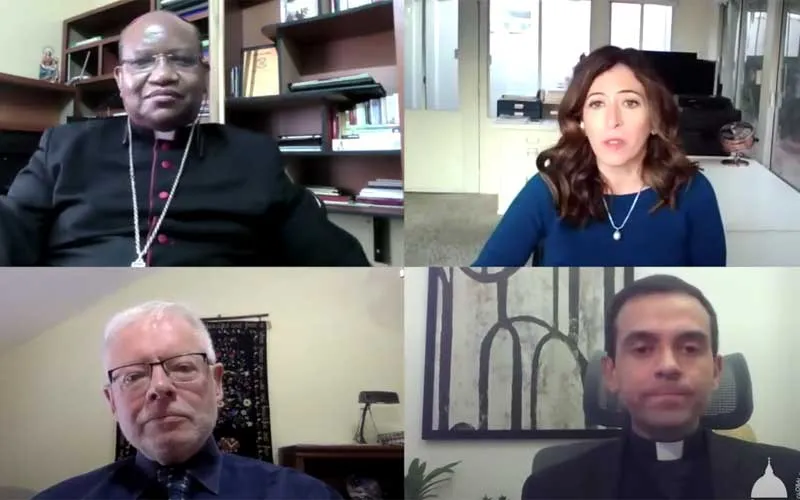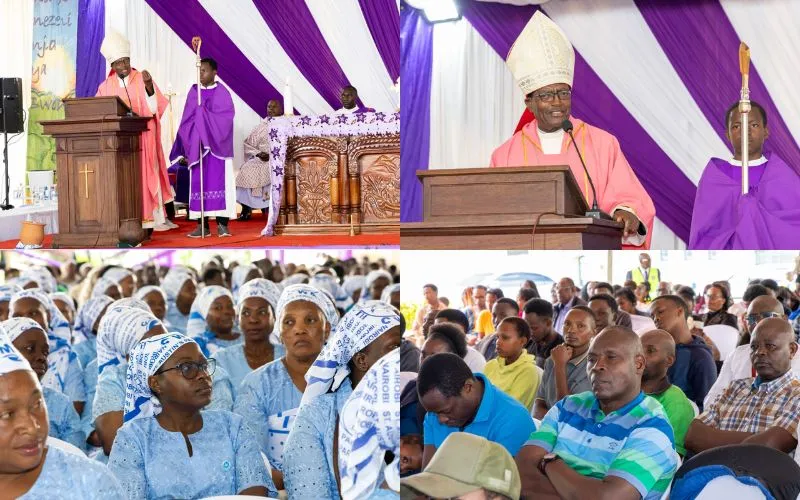The formation is done through GICM’s flagship Program of Church Management course in Rome as well as through The Shepherdship Courses offered to Parish Priests.
In her opening remarks at the event, Dr. Pia de Solenni, President and Executive Director of GICM who also moderated the session observed that transparency is not just a challenge of the Church but has always been an issue of concern in an entity that is supposed to be the model of society.
“Throughout the world, Catholic Dioceses face tremendous challenges in achieving financial transparency. Transparency isn’t just a challenge for the Church. It is also a challenge for other societal organizations and governments,” Dr. Solenni said.

She added, “I like to think that the Church can model this for the rest of society and for other organizations. The reality is that there is a combination of factors including cultural, legal and political that directly impact how each Diocese is supposed to practice financial transparency.”
(Story continues below)
In his presentation, Archbishop Muheria observed that many Dioceses in Africa, especially those in rural areas, do not have the required expertise to handle Church resources.
“Most of the financial experts are not in rural areas; they have gone into towns,” the Archbishop said and explained that the challenge of getting people willing to take up positions in financial committees.
Sometimes, he explained, Priests in rural places who do not have the required financial skills are likely to get intimidated by lay people in audit committees who are more knowledgeable in the field.
“You would find the Priest not willing to bring a person who is too educated to advise him because you feel a little bit of inferiority complex and that’s human,” the member of Opus Dei said.
In his considered view, transparency only works where Priests and Bishops are willing to accept guidance from people who have the required financial expertise.
“The act of humility is necessary for all Church leaders,” the 57-year-old Archbishop said, adding that in Africa, humility is not easy after a long tradition of authoritarian leadership.
“In Africa, a lot of that has been transmitted from a culture of very strong centralized authority of chieftainship… In most cultures, the strong authority was mostly what reflected good leadership. A leader who was strong, who was firm,” he said.
The “chieftainship” is not the kind of leader the Church, and society needs at the moment, the Archbishop said, explaining, “We want a leader who consults, who hears, who is able to then bring other better-informed persons to make a decision.”
He noted that it is only through transparency, and instilling a sense of financial accountability among the people, that his former Catholic Diocese of Kitui in Kenya was able to achieve sustainability.
“In my former diocese of Kitui, we didn’t have financial solidarity and so it wasn’t a financially sustainable Diocese. We ran the Diocese largely by debt, trying to make the Diocese grow into self-sustenance,” the Archbishop shared about the Kenyan Diocese he shepherded since 2008.
He explained that the process of transparency in the Diocese of Embu, where he started his episcopal service in January 2004, was not just about saying how much the Diocese was in debt.
“It was about making the people understand why we were making certain choices and we had a great response when we explained, maybe not with financial figures, but by taking them through why certain contributions had been directed where they had been directed and what we had been able to do, be it big or small,” the Archbishop who has also served as Apostolic Administrator of Kenya’s Machakos Diocese shared.
His idea all along, Archbishop Muheria shared, was to bring a lot of lay people with different types of corporate expertise on the financial committee.
In the beginning, there was resistance to bring lay people in boards that had been predominantly Clerical, he recalled and added in reference to the members of the Clergy, “No sooner did they see the fruits of this engagement of, say, accountants, professional engineers, of lawyers, of people who were in business than they saw that the ideas were much more mature.”
“It took a bit of time but I thank God now that in a Diocese that was not well endowed, we were able to manage for 12 years. And now, they are out of the woods in terms of they don’t have to beg,” the Archbishop who has been at the helm of Nyeri Archdiocese since June 2017 said.
Kenya’s Embu Diocese, which was 90 percent dependent on mission appeal, often going out to ask for financial assistance from other Dioceses in the United Kingdom, in the United States and in other countries, is now almost self-sufficient, Archbishop Muheria said.
“Now, we are basically self-sufficient and for the little mission appeals we do are for specific projects,” he further shared, adding that involving the people in management of Church resources is gratifying for those who feel that their contribution is going to good use.
“I think we as the Church want to have our Christians satisfied that their little penny has been spent in a useful way,” he said, and added, “That great satisfaction of the Church members is very important and leads to people being more willing to be engaged, more willing to contribute and more willing to come on board.”
Mr. Lundholm-Eades, the leadership consultant who participated in the webinar panel discussions, identified six processes in moving towards transparency in Church leadership.

The first step, he said, involves identifying the right people who have the expertise and the knowledge in financial management, which is followed by training of those people that have been identified.
The third step, the leadership consultant said, is creating standardization around the way things are reported.
“In standardizing you can have financial management software or program that is standardized throughout the Diocese or be in agreement what standardized reporting looks like in your Diocese; and there is regular publishing of reports. People start expecting it,” Lundholm-Eades said.
He added, “That standardization and regularization start to build a culture of transparency and in my experience, it takes 3-4 years at minimum to orient people to this culture.”
The fourth aspect is clear expectations-laid down standards of practice, the leadership consultant went on to say, and explained, “You do not have to reinvent these standards; they already exist. Caritas Internationalis, Catholic Relief Services (CRS), among other entities have them.”
At number five, Church organizations are required to get an external review or audit of their data, a process that Mr. Lundholm-Eades said is expensive but which is necessary to ensure “you are doing things the right way.”
The last stage of the transparency process involves the leader encouraging the laity and clergy to work together and to actively participate in the process.
It emerged during the webinar that in some Diocesan Finance Councils, members shy away from asking tough questions that pertain to the management of Church resources.
“From my experience, in most boards, though many people may be qualified, there is the culture of ‘don’t ask’ and the only solution to this is to change the people on the board,” Mr. Lundholm-Eades said and suggested, “Some 3-5 years on the board are long enough.”
Archbishop Muheria underscored the importance of rotational membership on Diocesan Finance Councils and encouraged members not to shy away from asking tough questions.
“Honesty in discussions, in giving opinions, is absolute in transparency. It makes no sense to have very highly qualified people on your board but they are not honest enough to tell you this or the other; to give a true opinion,” the Archbishop said.
Sharing about his own way of running affairs, the Kenyan Archbishop said, “In my committees and boards and with all persons involved in all those processes, we have bonding sessions, social interactions so that they feel free. They come to my house; we are able to have a meal; we are able to talk about other things. That breaks the ice for these barriers that may be there and helps them see humanity and openness.”

During the webinar, Fr. Cristian Mendoza, a Professor at the Pontifical University of the Holy Cross who is currently teaching a course in Fundraising at the Rome-based Institute highlighted the importance of publishing the names of the people who constitute the Finance Council.
The Cleric explained that the move of publishing the names not only gives them a sense of prestige but also helps put them in check to avoid cases of abuse or mismanagement of resources.












